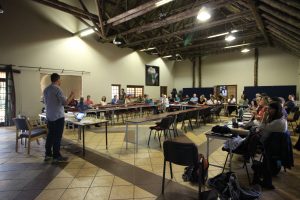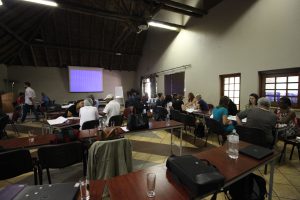Social media data for conservation science and practice with a focus on illegal wildlife trade and conservation marketing
VENUE: Educational Centre, South African National Biodiversity Institute, Pretoria National Botanical Garden, South Africa
16th of March 2018
09:00 – 13:30
WHO WE ARE: The Digital Geography Lab explores the use of novel big (and open) data sources and cutting-edge methods to support sustainable spatial planning and decision-making. We take advantage of new data sources, such as social media content and mobile phone call detail records, to carry out advanced spatial analyses of accessibility and mobility patterns, conservation opportunities and threats, and tracking illegal wildlife trade. Our research is conducted at various spatial scales in South Africa, Finland, and Uruguay, extending to continental and global scales.
We are currently working on two projects that focus on biodiversity conservation. In tracking the illegal wildlife trade on social media we are developing advanced machine learning tools that can be used to automatically identify verbal, visual or audio-visual content pertaining illegal wildlife products on social media (https://www.researchgate.net/project/Investigating-illegal-wildlife-trade-Innovative-approaches-to-inform-global-conservation-policy). The social media for conservation science project aims to understand if and how geospatial social media data can be used to support conservation science and practice, with a special focus on key biodiversity areas, national parks and local communities (https://www.researchgate.net/project/Social-media-data-for-conservation-science-2016-2020). The Digital Geography Lab is also a forerunner in open science and actively shares its research tools and data with different stakeholders both within and outside academia.
THE WORKSHOP: We will focus on research our group has carried and is carrying out in conservation science using social media data (see links above for relevant papers). Our work has a strong focus on South Africa. After short presentations introducing our work, we will organize the participants in working groups with the aim of discussing the potential of using social media data to inform conservation decision making with a focus on illegal wildlife trade and conservation marketing. Our goal is to receive feedback on our work and make it more relevant to conservation scientists and practitioners in South Africa. No previous knowledge on the use of social media for research is needed.
AGENDA
Tea/Coffee 08:30 – 09:00
Welcome and Introduction 09:00 – 09:10 Dr. Enrico Di Minin
Presentations + questions 09:10 – 09:50 Dr. Enrico Di Minin, Dr. Anna Hausmann and MSc Christoph Fink
Focus groups working and reporting 09:50 – 11:25 Workshop participants
Tea/Coffee 11:25 – 11:45
Plenary 11:45 – 13:15 Workshop participants
Summary and final words 13:15 – 13:30 Dr. Enrico Di Minin

